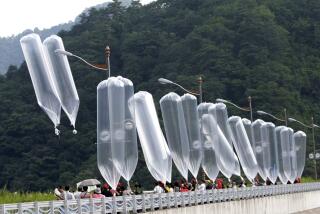North Korea’s Dictator Might Not Be Getting the Message
- Share via
Legend has it that a curious monument stands in Moscow: a two-faced building, with each side bearing no resemblance to the other half. When Josef Stalin was first presented with the blueprints, the story goes, he approved them. By accident, an alternative design was later sent him, and, having forgotten about the first plans, he approved these as well.
Fearing the brutal dictator, Stalin’s architects dared not disobey his wishes and erected the building with both facades. The discordant structure would stand as a monument to the problems of information flow.
Today, the U.S. is engaged in tricky, life-or-death negotiations with North Korea, whose all-powerful leader has been described as mercurial if not downright nutty.
Although we don’t know much about how decisions are reached within the Kim Jong Il regime, we do know this: In violent dictatorships, misinformation is the rule, and the ramifications can be absurd.
Most people think that dictators are always obeyed. They issue orders and their lackeys diligently carry them out. But although most dictators surround themselves with yes-men, these subordinates are not always as compliant as believed.
In Nazi Germany, for example, Hitler’s advisors exerted surprising influence over their leader. Albert Speer, Hitler’s architect, put it best in his postwar memoirs: “He had one extraordinary deficiency.... He had no understanding of, no feeling for the game of manipulation, indeed no suspicion that anyone could slowly, steadily work on him and manipulate him.”
As the climate of fear in Hitler’s Reich intensified, the advisors sought to protect themselves by tightening their control over the information flow. They often waylaid, altered and even withheld information from the Fuhrer altogether. And their actions had implications for war and peace.
Saddam Hussein’s yes-men also operated within a climate of uncertainty and fear, where those who fell from favor could be tortured, executed or simply made to disappear. To defend their positions and their personal safety, they too probably exerted intensive control over their information arsenal.
Americans have ridiculed Iraqi Information Minister Mohammed Said Sahaf for his outlandish assertions, but Sahaf’s behavior was not uncommon for violent regimes. Do not assume that he was any more truthful with Hussein.
Military leaders often play the same game. The New York Times reported that Iraqi generals were feeding Hussein’s son Qusai reports of high American casualties and defeats even as U.S. forces were entering Baghdad. Eventually, American and British forces may capture something even more significant than Hussein himself: the documents from which historians will learn how Hussein’s regime truly functioned. As those are combed, we may find that the Iraqi leader was as much the manipulated as the manipulator.
Drawing on the lessons from past dictatorships, U.S. negotiators who deal with North Korea must accomplish at least two critical tasks.
First, they must gauge the extent of influence that Kim’s advisors wield and estimate the nature of information flow to the leader. This will, at best, involve guessing.
Second, they need to ensure that any essential messages and signals intended for Kim are given directly to him without the intercession of his subordinates.
Kim’s advisors may have agendas about which we cannot guess. His subordinates’ personal machinations must not be allowed to manipulate international relations. Too much is at stake on a nuclear peninsula. The U.S. must neither forge new agreements nor act aggressively without absolute certainty that Kim has received all its intended messages.
To avoid future wars, we must win the battle for information.
More to Read
Sign up for Essential California
The most important California stories and recommendations in your inbox every morning.
You may occasionally receive promotional content from the Los Angeles Times.












